Retired Documentation
You are using the documentation for version 2.11.9. Go here for the latest version or check here for your available upgrades to the latest version.
Publish¶
Control Panel Location:
This is the area where you’ll create content for your site by publishing new Entries to your Channels. If you have more than one Channel, moving your cursor over the Publish menu will show all of your Channels and allow you to select one.
Tip
You can customize the display of the Publish Page by clicking Show Toolbar and creating a custom Publish Page Layout.
The Publish interface is broken into the following tabs:
Publish Form Tab¶
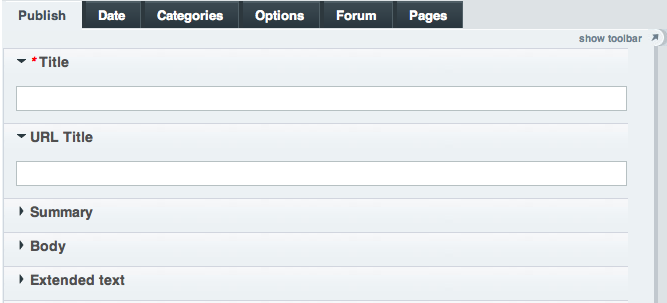
Title Field¶
This field contains the title of your channel entry. Titles can be up to 100 characters in length.
URL Title¶
Here you can define a “human readable” URL title for your entry. URL titles may only contain alpha-numeric characters and no spaces. The purpose of a URL Title is to enable your entries to be accessed using a URL such as:
http://example.com/index.php/channel/comments/joes_first_entry/
If you do not specify a “URL Title” one will automatically be created for you based upon your entry Title. URL Titles must be unique within a channel, so if an entry with the same title already exists then the URL Title will have a number appended to the end to make it unique.
Note
If you let the system create your URL Title for you it will convert spaces into underscores by default. For example, if the title of your entry is “Joe’s First Entry” it will be converted to “joes_first_entry”. If you prefer dashes to be used instead of underscores—there is some evidence that Google prefers URLs with dashes—you can change it with the Word Separator for URL Titles preference under .
Formatting Buttons¶
If the user accessing the Publish page has any HTML Formatting Buttons specified in their My Account page they will be displayed for use with the entry fields. Each user is allowed their own formatting buttons, which can be specified at
Entry Fields¶
The names and types of entry fields displayed will be determined by what Channel Fields you have defined for this channel. If an entry field is set to be “hidden” by default, it will have to be expanded by clicking on the field name before content can be entered. In addition to the field itself, you can also choose the type of Text Formatting to apply to that field. You’ll also notice “Check Spelling”, “Glossary”, and “Smileys” options beneath each field.
Write Mode¶
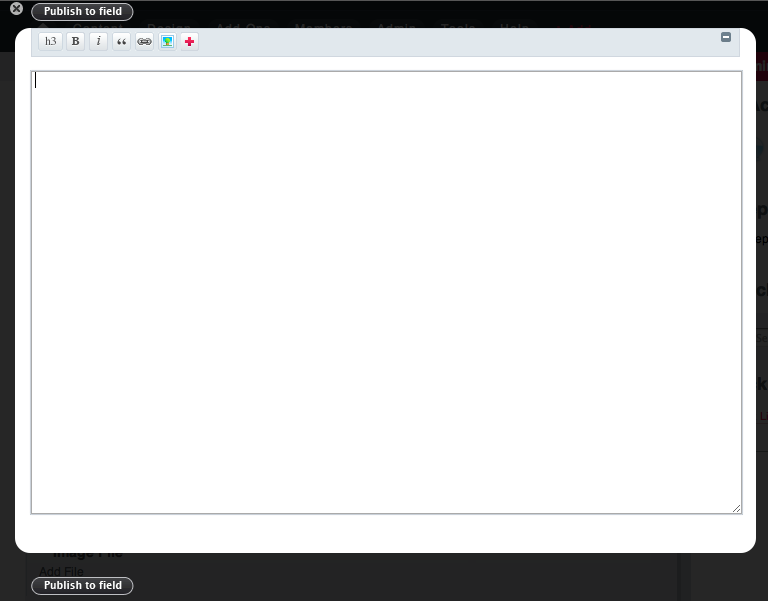 Write Mode allows for full-screen content editing. Write Mode is
initiated by clicking on the Pencil Icon:
Write Mode allows for full-screen content editing. Write Mode is
initiated by clicking on the Pencil Icon:
![]() When you finish editing content in Write Mode, don’t forget to click
“Publish to Field” to send your content back to the Publish Page.
When you finish editing content in Write Mode, don’t forget to click
“Publish to Field” to send your content back to the Publish Page.
Save Revision¶
Allows the content editor to force a revision save.
Submit¶
The Submit button allows you to save the entry and publish it to your site.
Date Tab¶
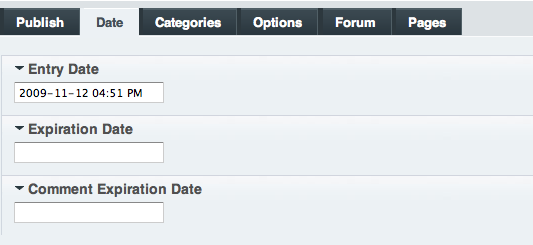
Entry Date¶
The entry date is the primary date associated with an entry. You may use the interactive calendar to set the date/time. If you specify a date in the future, ExpressionEngine will not display the entry on your site until the date has arrived. This behavior can be overruled if you instruct ExpressionEngine to include “future dates” in the Channel Tags in your Templates.
Expiration Date¶
You may optionally specify an expiration date for the entry, causing the system to no longer show the entry anywhere on your website after that date. You may also use an interactive calendar to set the date/time.
Comment Expiration Date¶
You may optionally specify a date on which comments for this entry will no longer be accepted. Once the date passes, the entry will act as though the Allow Comments checkbox (see below) is unchecked. You may also use an interactive calendar to set the date/time.
Categories Tab¶
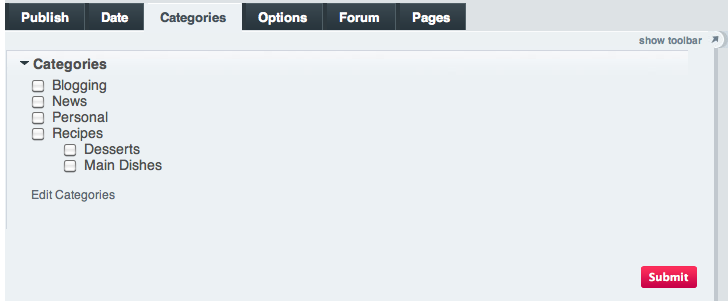 You may assign your entries to one ore more categories. To select more
than one category you will typically hold down the CTRL (or CMD) key
while choosing the individual category names.
You may assign your entries to one ore more categories. To select more
than one category you will typically hold down the CTRL (or CMD) key
while choosing the individual category names.
Clicking the Edit Categories link will permit you to add, edit, or delete categories that appear in the list.
Options Tab¶
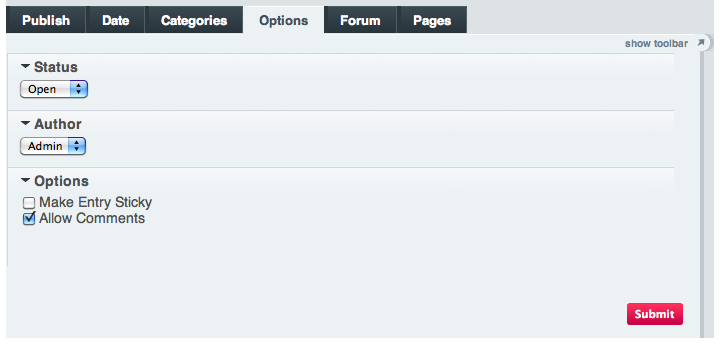
Author¶
You may select the author for this entry from the drop-down list. By default only the person submitting the entry is shown in the author list. If you would like to enable other authors so that the author name can be changed please see this troubleshooting page for information.
Channel¶
This option is only available when editing an entry.
This drop-down list will contain all channels that share the same Field Group, Category Group, and Status Group with the current channel for the entry. Using this option, you can move an entry from one channel to another channel that is set up similarly.
Status¶
There are two primary statuses that are always available: Open and Closed. Typically, “open” entries are viewable at your site, and “closed” entries are not. You can add additional statuses for editorial workflow in your Statuses page, and opt to display or suppress entries assigned to these by modifying the “status” parameter found in the various “Channel” Tags in your Templates.
Make Entry Sticky¶
If this option is checked, then the entry will be “stuck” at the top of the list when displaying multiple entries. This can be useful for things like announcement posts.
Allow Comments¶
If this option is checked, then comments will be allowed for this entry. When this option is unchecked, your comment submission form will be suppressed. Any existing comments will still appear.
Forum Tab¶
Note
This tab will only appear if you have the Discussion Forum Module installed.
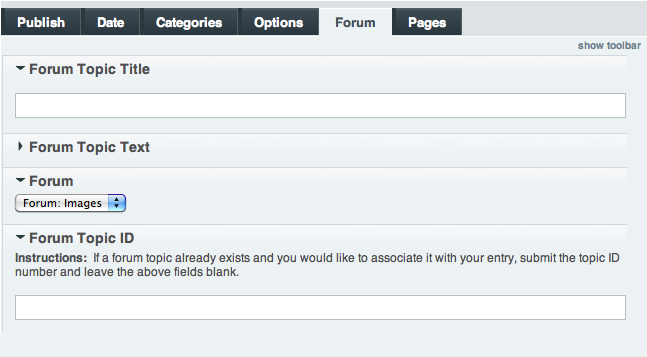
The Forum tab allows you to optionally publish a forum topic to be associated with the channel entry. You can then automatically link to the created forum topic from within your {exp:channel:entries} tag using the forum_topic_id variable.
Forum Topic Title¶
You may specify the title to use for the new thread in the forum.
Forum Topic Text¶
This is the main text for the forum thread.
You may use {permalink} to link from the Forum Entry to the Channel Entry. This variable is replaced by the URL set in the Comment Page URL preference under . The URL Title of the entry will be automatically added. For example, this:
<a href="{permalink}">my entry</a>
Would be rendered like this:
<a href="http://example.com/index.php/channel/comments/ice_cream/">my entry</a>
Forum¶
Here you choose in which forum the new thread should be added.
Forum Topic ID¶
Instead of the previous settings, you may instead specify the ID for an existing forum topic. This is useful if the forum topic already exists, or if you want it to have a Poll or other special features.
This is an “either/or” type situation. You may either have a forum thread created for you by specifying the title, text, and forum or you may associate the entry with an existing ID.
Revisions Tab¶
Note
This tab will only appear if you have Entry Versioning enabled in the particular channel’s preferences at .
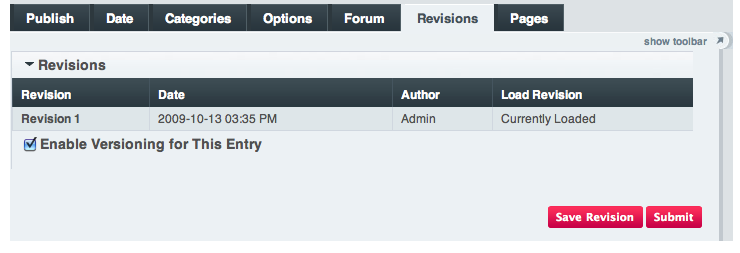 When Entry Versioning is enabled, every time you save changes to your
entries they will be saved so you can go back in time and retrieve older
versions of your entries. The Revisions Tab will show a list of all
revisions for the entry being edited.
When Entry Versioning is enabled, every time you save changes to your
entries they will be saved so you can go back in time and retrieve older
versions of your entries. The Revisions Tab will show a list of all
revisions for the entry being edited.
When a previous revision is selected it will be loaded into the Publish page form so you can view or further edit it. If you save your changes, a new revision will be created rather than updating the previous revision. In other words, every time you click the save button a new revision is stored.
Pages Tab¶
Note
This tab will only appear if you have the Pages Module installed.

Pages URI¶
Here you can choose the URI that will be used to display this “page” entry. Provide only the URI segments and not a full URL. Since this will be used in the URL, only URL safe characters are allowed, i.e. low ASCII alpha-numeric characters, underscore / dash separators, and periods.
CORRECT:
- /company/roster/board/ceo/
- /my_stuff/list.html
INCORRECT:
- http://example.com/index.php/company/roster/board/ceo/
- /my_stuff/über_list.html
Note
Entries cannot share the same Page URI. Each “page” entry must be given a unique URI so the system knows which entry to display when the Page URI is requested.
Template¶
Here you can choose which template to use to display this “page” entry when the above URI is requested.
